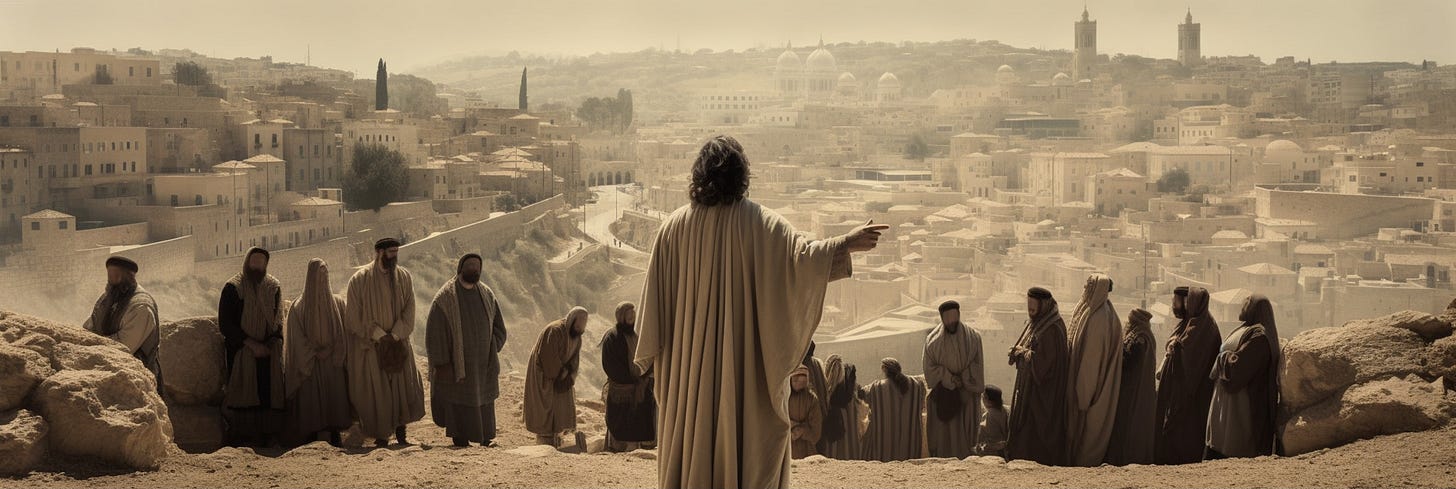Pick Me: Why not all followers are disciples
And why that is ok
Which Disciple Are You?
Turning seventeen, when I said my first yes to following Jesus, much about Christianity was new to me, including the bible. I don't remember where I got my first bible, but I remember my excitement at reading it. Some parts were stunning, clear, and captivating, yet many sections were opaque and mysterious (and remain so to me today).
I remember discovering the disciples and seeing their quirks, stumbles, and insecurities writ large over their desire to follow Jesus. In their ‘yes’ to Christ, I loved the honesty about who they were, their temperament, and their personalities revealed. When I read Luke 6:12-16 and imagined I was there, I saw myself desperate that Christ would pick me as a disciple.
I did something many have done and wondered if I had been there with Jesus, which disciple would have been most like me? Which one would I like to be like?
I wanted to be like Peter. Passionate and impetuous, always pursuing Jesus, even when making the most significant blunders. Yet, I am likelier to be most like John over time and with age. More than just for fun, and with some detailed background research, there is an online quiz you can take to see which discipline you might be most like.
Wondering which of the disciples we might be most like is the first step to discovering what kind of disciple we are and are invited to become.
I remember asking others in my church which disciple they would want to be and why. And as I did so, I quickly realised something. I had assumed all Christians would want to be like one of the disciples, as followers of Christ, but not everyone seemed excited at the idea.
Not All Followers Are Disciples
Not all followers of Jesus are disciples.
...and this should perhaps be obvious: very few followers of Jesus were disciples. But all disciples were followers. -Martyn Percy
Martyn Percy notes something we see in the bible and that we see in everyday life today, "Every disciple is a Christian. But not every Christian is a disciple. Just as every apostle was a follower, but not every follower was an apostle."
After exploring Matthew 28 and the call to "make disciples", Martyn claims we have misunderstood this passage. For no one can make disciples, for that is God's work. We can evangelise and share the Gospel, but whether and how people respond is between them and God.
It is a fascinating article, and you can download it from here. Aside from the ins and outs of the interpretations of Matthew 28:19, it rings true in daily life and experience.
For example, in COVID, I noticed the difference between followers and disciples. COVID impacted everyone. But those with discipleship practices integrated into their lives could lean into those when meeting with others in person was taken away: prayer, evangelism, giving and caring for others, et al. Amid loss and struggles, disciples had front and centre the habit and disposition of seeking hard after Christ to draw on in COVID.
Some in COVID discovered discipleship. But many without discipleship seemed to be most impacted by the crisis upon their faith.
Jesus said it was better that he departed from the first disciples so that he could send the Spirit and return so that others could become followers and disciples. Whilst not all followers are disciples, we are all invited to become disciples by the risen Christ. So why do followers not become disciples?
Three Kinds of People
Ignatius explores this dynamic of followers and disciples. In The Spiritual Exercises (#149-158), he talks about three types of people with three different ways/modes of following Jesus.1 These are "the postponer, the compromiser, and the free person."
The Postponer (#153) desires to follow God and order their life around Him but ultimately never gets around to taking action due to the pressing needs of life. The Compromiser (#154) is willing to take some action, but only with caveats and terms and conditions, i.e. that God conforms to their expectations and needs. The Compromiser does not trust that God knows and has the best for them. The Free Person (#155) is just that, free. Free to respond to Christ's call to follow him. Nothing has a hold over them, and all they are and have can be given up or kept in pursuit of Jesus. They can discover their identity in Christ unencumbered by the demands and any preconditions of God.
In the Exercises, the person undertaking them is invited to meditate before God on these three types of people, alongside bible passages, and talk honestly with God about which kind of person they are, who they want to be, and why. There is nothing but grace and love from God to experience in being honest with Him about the status and nature of how we follow him.
However, to undertake the Exercises and even get as far as such a reflection assumes a prerequisite desire to examine and be honest about the nature of our followership of God.
Statistically, people who take an advanced driving course are likely to have fewer accidents, even if they never take the final test of that course. This is because a person who wants to be a safer and better driver is likely to be a safer and better driver already. Those who think their driving is fine as it is and would never try to get better are statistically likely the least safe of drivers. Likewise, those who want to grow as disciples are more likely to undertake a reflection like those Ignatius provides.
My Experience of the Three Persons Mediation
Looking through my journals and experience of the Three Persons mediations, I wrote this:
I do not want to be close to death and see how I did not surrender my attachments. I do not want to be close to death and also see that I have compromised. To have worked around the deepest issues within me due to the fear that working on my experiences of loss will engender more loss. In this regard, my procrastination is about the circumstantial; thinking people not leaving will be what keeps me safe. The second type in me, compromise, means looking at how I respond to loss and lack and choose to behave differently. But the third person is at the soul level, the deepest place, where who I am before God would be transformed and find freedom from the losses I have experienced.
I asked God that I might be free enough to choose to follow so that "Whenever you go, I will go.”
Again, Christ and I enter the tomb, a movement to sit in the dark as the stone is rolled over the entrance. I talk about how this place was so lonely and full of anguish, but the Lord is never closer than he is now. Something is dying in me; attachments are dying around me.
As I sit in the dark, full of anguish, I realise I am not alone. I then lay down next to the dead, cooling dead body of Christ. I take his hand, tracing where the top of his hand would be. Suddenly, carefully and gently swaddling clothes and bandages are being wrapped around me. I am being buried with Him. This is the place I can sleep and find peace. It is the place where he slept after his passion and Gethsemane. And as I close my eyes, I descend to the dead with him. I am making up Christ's sufferings in my body, and resurrection is coming.
A Modern Version of the Three Kinds of Person
As I have thought about Ignatius's mediation on three kinds of people, I have wondered what a modern version for our consumer times and the world might be.
Three people suddenly and surprisingly inherit enough money never to have to work again and buy anything they want.
The First person can keep all the money and live to the oldest of ages, guaranteed to live free from suffering and pain, wherever they want, with any lifestyle they have dreamed of and desire. But in return, they can encounter very little, if anything, of God and his transformation in this life or their family, but will still go to Heaven when they die.
The second type of person, after they have done everything they want to with the inheritance for themselves, friends and family, guaranteed they live a long life without suffering and pain, and with that in place, will consider what God would have them do with the leftovers. They know they can experience some encounters with God but accept those will be limited, and they will never grow in their experience of God's love for them beyond what they already know. But they will go to Heaven when they die.
The Third type of person is shocked at their inheritance and immediately knows it might get in the way of them trusting and experiencing God. They go to God and ask that they might be free from any attachment to their new fortune. If they have to choose between encountering God and their money, they choose God. They tell God that if keeping the inheritance means any loss of their experiences of Him in this life, He should take the money from them. They would rather any loss than miss out on anything in their relationship with Jesus. But they also want to be free to keep the inheritance and use it for anything and any purpose the Lord directs them to and their deepest desire. In this condition, they might die prematurely and suffer greatly but experience the greatest love for God in this life and the next.
Colloquy
Spend some time considering these three types of persons. Can you be honest with yourself about which is most like you and which you want to be? Respond by speaking first with the Lord about this. Be honest with Him, for He loves that and you. Ask Him to show you why you are as you are. Talk with him about what He means to you and what you want Him to be for you. Ask Him what he wants you to be in your relationship with Him.
My favourite translation of The Three Kinds of People is by David Fleming.










Reading the second paragraph of this reflection, I realised that I've never actually pictured myself as being back in Jesus day, and as having any chance as being chosen as one of his disciples. I have also never really spent time reflecting on which disciple I might be most like, in terms of personality/temperament. I suspect this is because they were all men. It's undoubtedly been more subconscious than I've realised, but the underlying 'logic' is that Jesus didn't choose to include women among the twelve, and on this basis would never choose me... (an interesting idea that I might just need to explore a bit further)! Thanks for provoking thought and reflection...
Again, you comments have given me pause to reflect and consider. Shalom...Shalom.